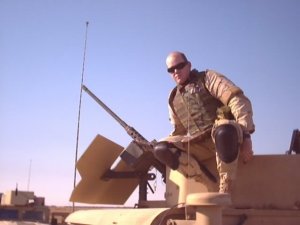There’s a ton of preamble I could put here, but let me set this tale with three twenty-year-old college students living for two months in the deep backcountry of Alaska. Deep. I’m talking deeper than Deliverance deep, but without any amorous hillbillies. To get there, we drove seven hours over an undulating strip of ragged pavement stretching across tundra under stormy skies. We flew 120 miles in a single-engine crate to land at an airstrip cut out of thick forest. We rode ATVs another seven miles to an extinct mining camp built and abandoned in the 40s. We took up residence smack-dab in the middle of the Wrangell Mountains.
We laid modern sleeping bags over rusty cots and draped mosquito netting over our heads. We coated ourselves in mosquito dope (that’s repellent to normal people) and spent a good portion of our days digging into the side of a riverbank and panning for gold. I could relate how I almost drowned in the river. I could tell you of the rainy afternoon when one of my buddies fired his .44 magnum past my head while we were sitting at our rickety dinner table.
However, this story about is the still vivid memory of watching that same guy—the one with the .44—sprinting down one side of a mountain saddle and up the other in hot pursuit of a wounded mountain goat.
I’m literally laughing as I type this. Don’t worry, though, this story has a happy ending.
About three weeks into our trip, my buddy and I got it into our heads that we’d go hunt and subsequently eat a mountain goat. His uncle (a then-resident of Alaska and facilitator of this trip) had encouraged us to break federal law and go poaching.
Yes, it was a monumentally stupid idea.
What can I say? We were twenty-year-old big-dumb-males taking advice from a questionable source. The uncle in question had fled to Alaska in the 70s to escape the draft, squatted an entire mountain valley, married an eskimo, and then sold the squatted land back to the government for some millions of dollars.
But I digress.
One bright, sunny morning, my buddy and I set out on “The Hunting Trip”… me with my .357 and he with is open sight 30-6. We hiked all morning from our already elevated campsite, through mosquito-infested underbrush and the occasional sign of grizzly bear, in search of our prey.
We hiked over several peaks searching for any sign of mountain goats. After the third peak, we were starting to get a bit discouraged, and, frankly, I was running out of steam. The thought of butchering a goat on the side of a mountain and hauling it back to our camp was starting to feel like an even worse idea than when we started.
However, my buddy is one of those guys that simply doesn’t give up. Ever. He’s what I like to refer to as dogged and relentless. He was committed, therefore, I was too. At the crest of the fourth peak, he stopped dead in his tracks, held up his hand and went down into a crouch.
The game was afoot, as Sherlock would say. Of course, Sherlock Holmes would have been smart enough not to be in that situation to begin with. We crept over the lip of the peak, and a small group of lazily grazing mountain goats came into view high on the far side of a grassy, rock-strewn saddle. They were a few hundred yards away. My buddy whispered that we needed to move closer so he could take a shot. We went into crouches, inching our way down the hill. Obviously, crouching would ease the suspicious minds of the goats. I should add that they just kept grazing. We were probably the first humans they’d ever seen.
Eventually, about 150 yards away, my buddy slowly unslung his rifle and went down onto one knee. It was an up-angle shot, so he couldn’t lay prone. I paused about ten feet behind him, crouched low, and held my breath as he took aim.
Seconds ticked by. More seconds. I looked at him, wondering if he was having second thoughts.
BANG!!!
His first shot rang out, echoing across the mountains around us. Adrenaline pumped through my system. I looked up the hill and saw a small cloud of dust drifting away about thirty feet high and to the right of the nearest goat. To my surprise, the goats shuffled left a bit and went right back to grazing. My buddy quickly chambered another round and took aim.
BANG!!!
“High and to the right again,” I said over his shoulder. His shot was closer this time—about twenty feet—but the goats still seemed oblivious. They shuffled a little farther left again and went right back to grazing. My buddy darted forward thirty feet and took aim.
BANG!!!
Another miss, I thought. I was laughing inside. The shot hit about ten feet behind one of the goats, and this time it ran up the hill and curved back, finally settling down and looking around, roughly fifty feet from where it had started.
I just couldn’t believe it: three misses and the goats apparently unaware of what was going on. It was laughable, ridiculous, comical. I felt like I was in a sit-com episode. And we weren’t even finished.
My buddy quickly took aim again, clearly frustrated by the failures.
BANG!!!
He snapped a shot off, and this time the goat bolted.
“You hit it!” I shouted. However, the expectant “prey dropping to the ground” moment didn’t happen. We were shocked and appalled to see the whole heard tearing straight up the mountain.
All I could do was stare. The first thing I thought was that the goat was injured and would end up dying miles away. It would have been wasteful on our part, even shameful. It was about that time I realized what a bad idea the outing had been. I keep reminding myself that twenty-year-olds are not well known for comprehending consequences.
My buddy, however—the dogged and relentless one—did more than stare. He went streaking after them, losing his straw cowboy hat in the process. Did I mention he was on the track team? Javelin thrower. Weight lifter. Runner. He raced down what was left of our side of the saddle and started up the other just as the goats disappeared over the next ridgeline. My buddy didn’t even slow down. He tore up the far side of the saddle, rifle in hand, intent on finishing what he started. We were pretty much committed now, but I knew that there was no way I could keep up with him, let alone the goats.
As he was halfway up the other side, he shouted back, “Head back to camp!” I have to admit, I was torn. Part of me wanted to follow along and help. However, common sense got the best of me. I retrieved his hat and headed back where I waited with our other friend, the one smart enough not to go. Naturally, my buddy came back empty-handed, but we at least got the rest of the story, which was a relief to us all.
“Did you get it?” I asked with mixed feelings about the whole thing.
“No,” he replied.
“But what about the goat?” Our folly was really starting to hit home. “You hit it.” I was worried that it would die out there and we would be responsible for wasting that life.
“It was a Texas heart shot,” he replied, a great deal of embarrassment on his face.
“A what?”
“A Texas heart shot,” he repeated. “I grazed its ass. Barely nicked it. It’ll be fine.”
It was too much. I’d already told the friend who stayed behind what I could, and at that point the two of us just cracked up. We couldn’t stop laughing.
To this day, we still talk about “The Hunting Trip” in Alaska where there is at least one mountain goat who would rather not have met humans. It is our belief that he lived a long life with a wary understanding of how stupid twenty-year-old big-dumb-males can be.




 After High School, I joined the U.S. Air Force as a means to attend college. I signed up as a computer programmer, knowing even then exactly what I wanted to do in life. Sadly, due to one of those strange twists of fate, they didn’t have room in that career field and offered me another. Since I spoke Japanese, I could change my job to a Cryptologic Linguist. This would mean I would be able to perfect the language I loved but didn’t master, as well as giving me the chance to live and learn in Japan. I jumped at the chance. Sadly, nobody warned me at that time that recruiters lie.
After High School, I joined the U.S. Air Force as a means to attend college. I signed up as a computer programmer, knowing even then exactly what I wanted to do in life. Sadly, due to one of those strange twists of fate, they didn’t have room in that career field and offered me another. Since I spoke Japanese, I could change my job to a Cryptologic Linguist. This would mean I would be able to perfect the language I loved but didn’t master, as well as giving me the chance to live and learn in Japan. I jumped at the chance. Sadly, nobody warned me at that time that recruiters lie.